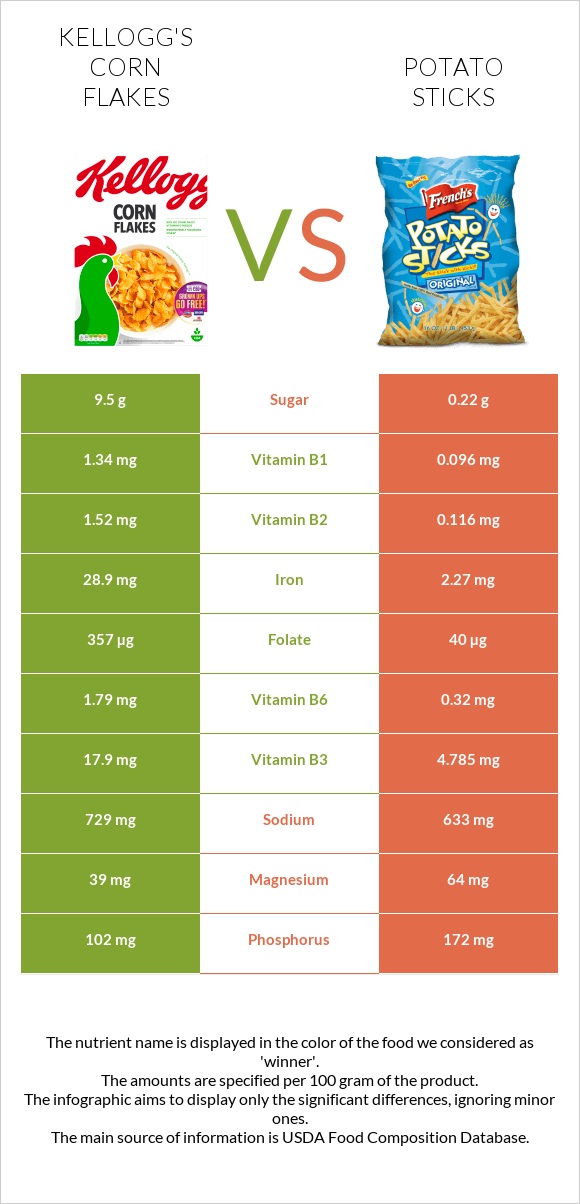Kellogg's Corn Flakes vs. Potato sticks — In-Depth Nutrition Comparison
Compare
A recap on the differences between kellogg's Corn Flakes and potato sticks
- Kellogg's Corn Flakes have more iron, vitamin B12, vitamin B6, vitamin B2, vitamin B1, vitamin B3, folate, and vitamin A; however, potato sticks are higher in vitamin E.
- Kellogg's Corn Flakes cover your daily iron needs 333% more than potato sticks.
- Kellogg's Corn Flakes have less saturated fat.
Food varieties used in this article are Cereals ready-to-eat, KELLOGG, KELLOGG'S Corn Flakes and Snacks, potato sticks.
Infographic

Infographic link
Mineral Comparison
Mineral comparison score is based on the number of minerals by which one or the other food is richer. The "coverage" charts below show how much of the daily needs can be covered by 300 grams of the food.
| Contains more IronIron | +1173.1% |
| Contains more MagnesiumMagnesium | +64.1% |
| Contains more CalciumCalcium | +260% |
| Contains more PotassiumPotassium | +636.3% |
| Contains more CopperCopper | +59.1% |
| Contains more PhosphorusPhosphorus | +68.6% |
| Contains less SodiumSodium | -13.2% |
| Contains more ManganeseManganese | +151.8% |
Vitamin Comparison
Vitamin comparison score is based on the number of vitamins by which one or the other food is richer. The "coverage" charts below show how much of the daily needs can be covered by 300 grams of the food.
| Contains more Vitamin AVitamin A | +∞% |
| Contains more Vitamin DVitamin D | +∞% |
| Contains more Vitamin B1Vitamin B1 | +1295.8% |
| Contains more Vitamin B2Vitamin B2 | +1210.3% |
| Contains more Vitamin B3Vitamin B3 | +274.1% |
| Contains more Vitamin B6Vitamin B6 | +459.4% |
| Contains more Vitamin B12Vitamin B12 | +∞% |
| Contains more FolateFolate | +792.5% |
| Contains more Vitamin CVitamin C | +125.2% |
| Contains more Vitamin EVitamin E | +7491.7% |
| Contains more Vitamin B5Vitamin B5 | +76% |
| Contains more Vitamin KVitamin K | +∞% |
All nutrients comparison - raw data values
| Nutrient |  |
 |
DV% diff. |
| Iron | 28.9mg | 2.27mg | 333% |
| Vitamin B12 | 5µg | 0µg | 208% |
| Polyunsaturated fat | 0.196g | 17.9g | 118% |
| Vitamin B6 | 1.79mg | 0.32mg | 113% |
| Vitamin B2 | 1.52mg | 0.116mg | 108% |
| Vitamin B1 | 1.34mg | 0.096mg | 104% |
| Vitamin B3 | 17.9mg | 4.785mg | 82% |
| Folate | 357µg | 40µg | 79% |
| Vitamin E | 0.12mg | 9.11mg | 60% |
| Vitamin A | 490µg | 0µg | 54% |
| Fats | 0.4g | 34.4g | 52% |
| Saturated fat | 0.116g | 8.88g | 40% |
| Potassium | 168mg | 1237mg | 31% |
| Vitamin C | 21mg | 47.3mg | 29% |
| Vitamin D | 143 IU | 0 IU | 18% |
| Vitamin D | 3.6µg | 0µg | 18% |
| Vitamin K | 0µg | 22.1µg | 18% |
| Monounsaturated fat | 0.067g | 6.16g | 15% |
| Copper | 0.198mg | 0.315mg | 13% |
| Manganese | 0.168mg | 0.423mg | 11% |
| Carbs | 84.1g | 53.3g | 10% |
| Phosphorus | 102mg | 172mg | 10% |
| Calories | 357kcal | 522kcal | 8% |
| Magnesium | 39mg | 64mg | 6% |
| Choline | 8.7mg | 34.9mg | 5% |
| Sodium | 729mg | 633mg | 4% |
| Vitamin B5 | 0.229mg | 0.403mg | 3% |
| Protein | 7.5g | 6.7g | 2% |
| Calcium | 5mg | 18mg | 1% |
| Protein per 100 calories | 2.100840336134454g | 1.2835249042145593g | N/A |
| Calories per 10 g protein | 476kcal | 779.1044776119403kcal | N/A |
| Net carbs | 80.8g | 49.9g | N/A |
| Sugar | 9.5g | 0.22g | N/A |
| Fiber | 3.3g | 3.4g | 0% |
| Zinc | 1mg | 0.99mg | 0% |
| Selenium | 8.3µg | 8.1µg | 0% |
| Tryptophan | 0.045mg | 0% | |
| Threonine | 0.227mg | 0% | |
| Isoleucine | 0.25mg | 0% | |
| Leucine | 1.044mg | 0% | |
| Lysine | 0.079mg | 0% | |
| Methionine | 0.136mg | 0% | |
| Phenylalanine | 0.374mg | 0% | |
| Valine | 0.306mg | 0% | |
| Histidine | 0.17mg | 0% |
Macronutrient Comparison
Macronutrient breakdown side-by-side comparison
Protein:
7.5 g
Fats:
0.4 g
Carbs:
84.1 g
Water:
3.76 g
Other:
4.24 g
Protein:
6.7 g
Fats:
34.4 g
Carbs:
53.3 g
Water:
2.2 g
Other:
3.4 g
| Contains more ProteinProtein | +11.9% |
| Contains more CarbsCarbs | +57.8% |
| Contains more WaterWater | +70.9% |
| Contains more OtherOther | +24.7% |
| Contains more FatsFats | +8500% |
Fat Type Comparison
Fat type breakdown side-by-side comparison
Saturated fat:
Sat. Fat
0.116 g
Monounsaturated fat:
Mono. Fat
0.067 g
Polyunsaturated fat:
Poly. Fat
0.196 g
Saturated fat:
Sat. Fat
8.88 g
Monounsaturated fat:
Mono. Fat
6.16 g
Polyunsaturated fat:
Poly. Fat
17.9 g
| Contains less Sat. FatSaturated fat | -98.7% |
| Contains more Mono. FatMonounsaturated fat | +9094% |
| Contains more Poly. FatPolyunsaturated fat | +9032.7% |





